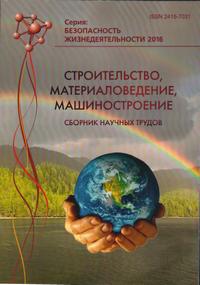Utilization fallen foliage in the city
Keywords:
fallen foliage, grass clippings, fuel, plant wasteAbstract
The article discusses current approaches to the treatment of fallen leaves within major cities, provides ecological and economic assessment of potential recycling activities proposed use fallen leaves as a secondary raw material. Methodology. Research methods used in writing the article, based on an integrated approach to the study of economic and environ-mental issues, in particular energy, light and food industry and ecology. Findings. Large amounts of resource potential are of considerable interest in the possible areas of application. Energy, environmental, construction and others. Ways to use plant waste to the urbanized areas of the city are of a direct economic profit. Originality. The environmental and economic effects of the use of such fuel briquettes for small and average power can determine the competitiveness of this type of fuel in comparison with the traditional. Practical value. Using fallen leaves is a promising direction and resource base itself is under-utilized. Among the priority uses of fallen leaves as a secondary resource is composting with subsequent production of biogas and fertilizer. The use of briquetted fuel fabrication technology hastily leaves with the use of EHF technologies are promising direction of development, and currently under-developedReferences
Popyk, O. V. (2014). Ekoloho-ekonomichni aspekty povodzhennia z opalym lystiam na urbanizovanykh terytoriiakh [Ecological and economic aspects of the handling of fallen leaves in urban areas Economic innovation]. Economic Innovation, 58, pp. 266-272.
On basic principles (strategy) of the State Environmental Policy of Ukraine till 2020, Pub. L. No. 2818-VI, 218 Cabinet of Min-isters of Ukraine (Bulletin of Verkhovna Rada Ukraine 2010).
Shalimov, N. A. (2011). Utilizatsiya teplovyih resursov [Utilization of thermal resources]. Cis-Black Sea Ecological Bulletin, (3), pp. 128-130.
Sotnyk, I. M. (2008). Ekoloho-ekonomichni mekhanizmy motyvatsii resursozberezhennia [Ecological and economic mechanisms of motivation resource]. Sumy: VVP «Mrija» TOV, 330 p.
Yelizarov, А, & Lysenko, О. (2013). Otrymannia biohazu z opaloho lystia [Leaf litter biogas production]. Bulletin of Kremen-chuk Mykhailo Ostrohradskyi National University, 4, pp. 166-169.
Soroka, M., and Yarishkіna, L. (2013). Perspektivyi primeneniya opalyih listev dlya tseley lokalizatsii i sbora razlivov neftepro-duktov [The prospects of using follen leaves for the clean-up of oil spills]. Eastern-European Journal of Eenterprise Technologies, 1/6, 37-41.
Soroka, M. (2014). Opyityi proizvodstva stroitelnyih gipsovyih plit na osnove opavshey listvyi [Experiments production of con-struction gypsum board based on fallen leaves]. In Ecology, environmental management and environmental protection: A collection of articles based on III All-Russian scientific-practical conference with international participation (Vol. 2, pp. 364-367). Krasnoyarsk, Russia: Lesosibirskiy branch federal state budgetary educational institutions of higher education "Siberian State Technological Univer-sity"
Trubina, M. (2013). Normatyvno-pravove ta instytutsiine zabezpechennia upravlinnia vidkhodamy v Ukraini [Regulatory and in-stitutional support waste management in Ukraine]. Finance Law, (2), pp. 27-29.
Geletukha, G. (2010). Otsinka enerhetychnoho potentsialu biomasy v Ukraini [Evaluation of the energy potential of biomass in Ukraine.Industrial Heat], 32(5), pp. 58-65.
Program waste recycling plant in the city Kyiv for 2007-2010. (n.d.). Retrieved May 24, 2016, from http://www.uazakon.com/documents/date_60/pg_gcntsr.htm
Sazanova, E. (2007). Sposob utylyzatsyy orhanycheskykh otkhodov dlia poluchenyia byohumusa v uslovyiakh horoda [A meth-od of recycling organic waste to produce vermicompost in a city]. In The problems of collection, processing and recycling of waste. Odessa, Ukraine: Ltd. "INVATS", 2000 p.
Zaporozhets, O., V. Savchenko, G. Karabtsov, A. Soloveykina, and S. Karpenko. Palyvo z biomasy na osnovi opaloho lystia [Biomass Fuel Based on Dead Leafs]. Proceedings of the National Aviation University, no. 1 (2010): pp. 185-90.
Dyakonov, V., O. Skrypnyk, and О Dyakonov. Osoblyvosti funktsionuvannia hnuchkykh tekhnolohii pererobky roslynnykh ta derevynnykh vidkhodiv [Features Functioning Flexible Technology of Processing Plant and Wood Waste]. Construction, Materials Science, Mechanical Engineering: Proc. Scientific Works, no. 85 (2015): pp.113-117.
Diakonov, V. & Diakonov, O. & Skrypnyk O., (2015). Utylizatsiia roslynnykh i derevnykh vidkhodiv parkovoi zony mista [Disposal plant and wood residues parkland city]. Scientific and technical collection is the Communal economy of cities (124), pp. 49-52.
Downloads
Issue
Section
License
Редакція Видання категорично засуджує прояви плагіату в статтях та вживає всіх можливих заходів для його недопущення. Плагіат розглядається як форма порушення авторських прав і наукової етики.
При виявлені у статті більш ніж 25% запозиченого тексту без відповідних посилань та використання лапок, стаття кваліфікується як така, що містить плагіат. У цьому випадку стаття більше не розглядається редакцією, а автор отримує перше попередження.
Автори, в статтях яких повторно виявлено плагіат, не зможуть публікуватися в усіх журналах Видавництва ДВНЗ «Придніпровська державна академія будівництва та архітектури».
Автори, які публікуються у цьому журналі, погоджуються з наступними умовами:
- Автори залишають за собою право на авторство своєї роботи та передають журналу право першої публікації цієї роботи на умовах ліцензії Creative Commons Attribution License, котра дозволяє іншим особам вільно розповсюджувати опубліковану роботу з обов'язковим посиланням на авторів оригінальної роботи та першу публікацію роботи у цьому журналі.
- Автори мають право укладати самостійні додаткові угоди щодо неексклюзивного розповсюдження роботи у тому вигляді, в якому вона була опублікована цим журналом (наприклад, розміщувати роботу в електронному сховищі установи або публікувати у складі монографії), за умови збереження посилання на першу публікацію роботи у цьому журналі.
- Політика журналу дозволяє і заохочує розміщення авторами в мережі Інтернет (наприклад, у сховищах установ або на особистих веб-сайтах) рукопису роботи, як до подання цього рукопису до редакції, так і під час його редакційного опрацювання, оскільки це сприяє виникненню продуктивної наукової дискусії та позитивно позначається на оперативності та динаміці цитування опублікованої роботи (див. The Effect of Open Access).

